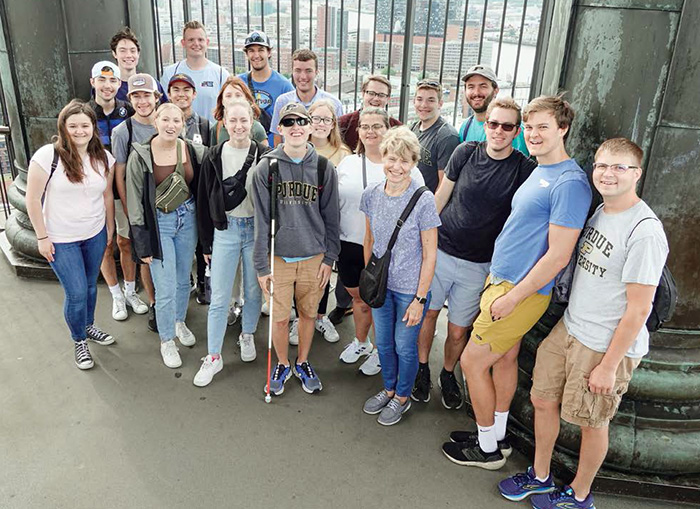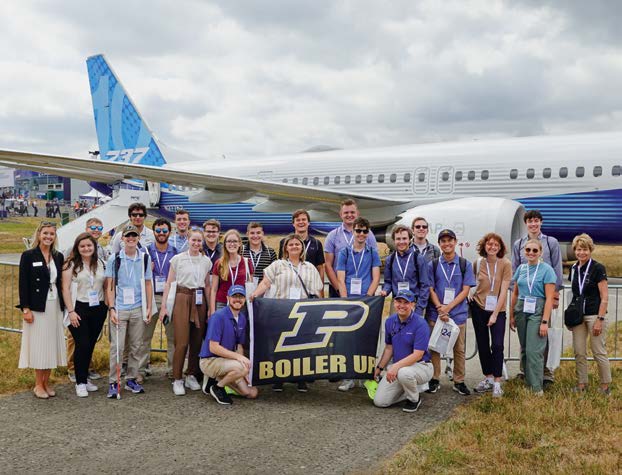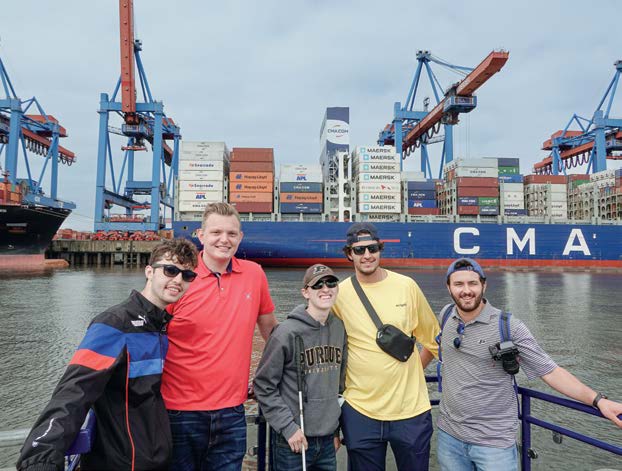Accessing Transportation

Junior David Kopp (front, center) with fellow students during the two-week 21st Century European Transportation study abroad course.
Visually impaired student experiences European transit systems through study abroad
Study abroad opportunities offer students a unique opportunity to not only experience differences in culture, but how those differences affect engineering and design.
One of the most popular study abroad opportunities offered at the Lyles School of Civil Engineering is the two-week 21st Century European Transportation course led by Darcy Bullock, the Lyles Family Professor of Civil Engineering. Each May, students travel throughout Europe, where they learn about the construction and operational activities involved in integrating the region’s airports, trains, ports, subway, pedestrian and bicycle infrastructure. Supply chain logistics are also addressed during site visits to automotive and aircraft assembly plants.
Major cities visited in the past include London, Berlin, Hamburg, Munich, Prague and Paris. While there, students experience the various transportation systems such as railways, airports and bicycle paths. They also visit cultural landmarks as well as major transportation industries such as the Volkswagen assembly lines, Berlin Brandenburg Airport construction site and the Hamburg Airbus aircraft assembly plant.
“It’s active learning; it’s something you cannot get in class — or even in our country,” Bullock said. “The cultural aspect, along with gaining an upclose understanding of how public transportation operates in other countries, opens you up to new ideas and you gain a great appreciation of the different challenges other countries and industries outside of the U.S. face.”

The 2022 study abroad trip included a civil engineering student who experienced it unlike others had in the past. Junior David Kopp has a genetic eye disorder called aniridia. In Kopp’s case, it has led to total blindness in both of his eyes. Due to his condition, Kopp said, he has always had a special interest in both civil engineering and public transportation since they greatly impact his ability to travel.
“Public transportation has a huge impact on my life,” Kopp said. “It’s how I get around and it’s what I depend on. That’s why I wanted to study transportation engineering so I can both learn more about a great interest of mine and help improve the future of public transportation in America.”
To further his understanding of transportation engineering, Kopp said he was eager to participate in Bullock’s study abroad course.
“Everything that I’ve learned about public transportation in Europe is that it’s far more robust than what we have here, so I was very interested in experiencing it all for myself,” Kopp said. “Also, just the chance to travel outside of the country and experience other cultures was very appealing to me.”


The trip, Kopp said, did not disappoint. In particular, Kopp said he was blown away by London’s bus and tube systems as well as Germany’s highspeed rail network.
“Those cities definitely resonated with me the most,” he said. “To experience how advanced and efficient their public transportation networks were — and how easy it was for me to use them even though I never had before — was incredible. The ease of use and access of public transportation that some cities and countries in Europe have was something I had never experienced before.”
Bullock said it was also an amazing experience to travel with Kopp and share in his discoveries.
“Honestly, I was a little nervous at first given that we would be in a completely different environment, but it was never an issue,” Bullock said. “He integrated himself seamlessly with the rest of the group and was a tremendous addition. And to see for myself how well the cities’ transportation systems accommodated people with disabilities was also impressive.”

Overall, Kopp said, the lessons learned from the two-week course will stick with him forever and has only deepened his love and interest for both civil engineering and Purdue.
“To have opportunities like this and to learn from some of the best civil engineers in the world is why I chose to come to Purdue in the first place,” Kopp said. “The environment, the people, the doors a Purdue education provides are invaluable to me and it makes me proud to be both a civil engineer and a Boilermaker.”
